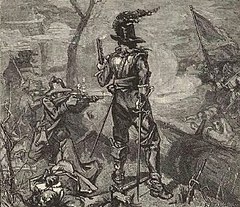This article needs additional citations for verification. (November 2008) |
| Associators | |
|---|---|
 A 1764 illustration of the Pennsylvania Associators assembling in Philadelphia after news of the Paxton Boys marching on the city | |
| Active | 1689-1784 |
| Country | |
| Allegiance | |
| Branch | colonial militia, independent volunteers, military association, refugees, partisans, (auxiliary troops) |
| Type | infantry, dragoons (mounted infantry), artillery |
| Size | company-regiment |
| Engagements | Maryland Protestant Rebellion (1689)
King George's War (1744-1748) French and Indian War (1754-1763) American Revolutionary War (1775-1783) |
| Commanders | |
| Notable commanders |
|




Associators were members of 17th- and 18th-century volunteer military associations in the British American thirteen colonies and British Colony of Canada. These were more commonly known as Maryland Protestant, Pennsylvania, and American Patriot and British Loyalist colonial militias. But unlike militias, the associator military volunteers were exempt from regular mandatory military service. Other names used to describe associators were "Associations", "Associated", "Refugees", "Volunteers", and "Partisans".
The term Non-Associators was applied to American colonists who refused to support and sign "military association" charters. They were not affiliated with associators, or would choose instead, to pay a fine and suffer possible retaliation. During the American Revolutionary War, some associator units were said to operate more like, or were in fact loose-knit criminal gangs, taking advantage of the disruption of warfare.
The present-day U.S. Army 111th Infantry Regiment Pennsylvania Army National Guard's 56th Stryker Brigade Combat Team, 28th Infantry Division is nicknamed the "Associators", helping to preserve the volunteer associators' ancestral legacy in Pennsylvania.
